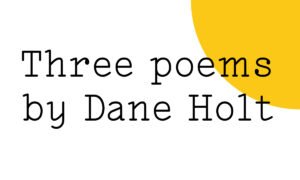Three poems by Lex Runciman
Each of Lex Runciman’s poems feels like a gift. His first, ’After What You Have Been Through’, offers the chance to take time out, to concentrate on what it is to just be. What has the “you” of the poem been through? Could be anything, could be everything – what matters is the space that the poem opens up for a reader to reconnect with him- or herself. Follow the rhyme and sonic echo threading through the poem – from ‘roses’ we travel, via ‘hose’, ‘crows’, ‘slow’, ‘excuses’ and ’through’ to the final word, ‘choose’. The effect is lulling, almost hypnotic. The poem reads as if addressed to any one of us, and ends by putting our own future gently but firmly in our own hands.
‘Talk’ focuses on communication, and Runciman extends his focus to include the animal kingdom – crows, orcas, Herman Melville in his cabin listening to whale sounds. He digs in to everyday interactions between people – what we do, what we say, what we mean by what we say – and tests the limits to our mutual understanding. Central to the poem is an interaction where the giving of “small aid” is met with an apology. Why? And what does the woman on the bus say? There’s something elusive in this poem, but we think this is intentional. Runciman seems to imply that some interactions are straightforward, but others are not, and that if we only took a little more time with each other, we could communicate better.
‘“We Need Other People to Be Anybody at All”’ is an expansive, populous poem. In it, Runciman explores our interdependence, and lobbies for a fairer world, not in an overtly political or tub-thumping way but by appealing to our common humanity and our shared needs and desires. These glimpses into people’s lives convey a real sense of intimacy. There’s a sense of inevitability at the end as the river changes its habits according to the seasons, regardless of the people living alongside it.
After What You Have Been Through
If you have roses, it would be good
to water them now, though it be late, late
September, the few new, unlikely
blooms… Inhale. Claim your time. Aim
the hose at the roots. If you have
no roses, then recall how good it feels
to climb five stairs and need no
pause or rest, for today your shabby lungs
greet you, amiably, and your aged heart
agrees. Or, if you have no roses and no
stairs, you might sit outside and gaze
at an intermittent slug trail, for example,
glistening, neither straight line nor clear arc.
You might listen to how noise alters – crows,
motors, a dog’s bark… how they come and go.
Thing is, you have at least a dozen
excuses to burn now, slow as you wish, one
by one, after what you have been through,
days returned now, nights quiet,
hours in your hands as you choose.
Talk
What crows discuss is to me not clear,
nor do I know how a pod of orca hunts
to circle a seal – whether by instinct or by talk.
Hammock-slung in the Acushnet’s fo’c’sle,
Melville heard whale intelligence through the hull.
Once on O’Connell bridge I gave small aid.
The response I heard was, “sorry, sorry.”
What is it to each other we say? Please
take this half of ripe pear even now dripping
where the knife edge has parted it.
You first, she says, holding the door.
From the bus seat behind us, a woman
whose face we never see leans forward,
says to our ears hushed words of wish and need.
She not made rich, we not made poor.
“We Need Other People to Be Anybody at All”
Nikhil Krishnan, The New Yorker, 3 October 2022
The Springwater bicycle and walking trail parallels
a river I love, even as in late hot September
its slack backwater goes algal. I walk briskly
and pass tents the houseless pitch under a bridge –
aroma and particulates of woodsmoke, pallets broken up
for fire for cooking and companionable warmth: good
morning, I say, or stay warm, or stay safe. One
with a shaved head and flourishing mustache
nods, another, unwilling to meet any gaze says, you
too, sometimes, quietly, and looks away. A pit-bull,
chained, stands wary. When a near neighbor travels, I miss
windows closing, opening, lights on in another kitchen,
Taj Mahal singing. One neighbor transitions, man to woman.
Another we know by his dog, his fedora, and
his limp (the neighbor’s, not the dog’s). And when
a woman my age walks past, shouting shut the fuck up,
goddamn it, shut up, I recognize her face: she speaks
to the voices in her head. Nothing about this reflects
fair distributions, except the wish to look, walk, be
human, less angry, fed, and warm. The winter
river rises quick, high and brown, then, summer,
the color of conifers on its shore.

